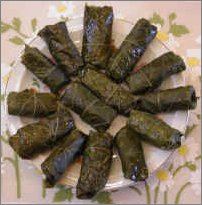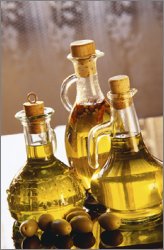|
|

|

The 6 Healthiest Staple Foods in Greek Cuisine
by www.SixWise.com Greece is thought to be a birthplace for the culinary arts,
and the first Greek chefs enjoyed much esteem. Along with
being credited as developing many original cooking techniques,
the Greeks are said to be the first to don the chef's hat.
Their cuisine is known for encompassing rich flavors that
are more tangy than spicy. While lamb is the principle meat
in Greek dishes, fresh seafood, vegetables and fragrant herbs
are also popular.
Greek food is often thought of as comfort food because of
its vast array of meat and vegetable dishes (like the Greek
equivalent of shepherd's pie, moussaka), but it is also one
of the healthiest cuisines out there. If you'd like to try
your hand at making a healthy Greek dish of your own, use
plenty of the foods below, and check out the tasty recipes
that follow.
1. Lemons
In Greece, lemons
are used as a feature flavor in sauces, appetizers, entrées,
salad dressings and the popular avgolemono, or Greek egg-lemon
soup.
Health Benefits: Lemons are an excellent source
of vitamin B6, iron and potassium, and a very good source
of dietary fiber and vitamin C. They also contain calcium,
copper, folic acid, magnesium, manganese, phosphorus and
zinc.
Aside from their many nutrients, lemons are rich in bioflavonoids,
which protect against damage from free radicals, act as
natural antibiotics and may help prevent heart disease and
cancer. Lemons are also anti-bacterial and anti-septic,
making them good for mouth ulcers, canker sores and sore
throats.
Finally, lemon pulp and skin contains pectin, a compound
that may lower cholesterol and blood sugar levels in diabetics.
2. Eggplants
Many of Greece's most famous dishes -- like moussaka and
melitzana salata, an eggplant dip -- contain eggplant, which
is known for its slightly bitter flavor and spongy texture.
Eggplants are part of the nightshade family of vegetables,
along with tomatoes, sweet peppers and potatoes.
Because of its bitter taste, when eggplants first came
about they were regarded as quite dangerous -- it was believed
that they could instantly cause cancer, leprosy and even
insanity.
Health Benefits: Eggplants are a rich source of phytonutrients,
which have potent antioxidant properties. One such nutrient
is nasunin, found in the eggplant's skin. Nasunin is an
antioxidant that protects against free radical damage and
protects the fats in brain cell membranes.
Eggplants also contain chlorogenic acid, which is known
to have anti-cancer, antimicrobial, and antiviral properties,
as well as help lower LDL (bad) cholesterol. They're a good
source of dietary fiber, potassium, manganese, copper and
vitamin B1.
 |
3. Grape leaves
Grape leaves are a popular wrapper for rice and meat in
Greek cuisine. Perhaps the most popular use is for dolmathes,
an appetizer of grape leaves stuffed with rice, onions and
sometimes ground beef.
You can find grape leaves canned or bottled, but fresh
leaves can also be used after they're steamed or blanched.
Health Benefits: Aside from being incredibly low
in calories (five leaves have only about 14 calories), grape
leaves are packed with nutrients including vitamins C, E,
A, K and B6, niacin, iron, fiber, riboflavin, folate, calcium,
magnesium, copper and manganese. If you use the bottled
variety, give them a rinse before you use them. This will
remove some of the excess sodium in the brine.
4. Spinach
Greece is famous for its spanakopita, a spinach pie, but
spinach is also a popular addition to Greek casseroles,
side dishes, entrees, appetizers and soups.
Spinach also happened to be a favorite food of Catherine
de Medici, who lived in the 16th century in Florence, Italy.
She left home to marry the king of France, and made sure
to bring her cooks who could prepare her spinach dishes.
This is how foods served with spinach came to be known as
"a la Florentine."
Health Benefits: Spinach is loaded with health benefits.
It contains at least 13 different flavonoid compounds that
are potent antioxidants and are known to fight cancer. It
also contains ample quantities of nutrients that can help
protect your bones, heart, brain and eyes, and fight inflammation,
asthma, osteoarthritis, and rheumatoid arthritis. Plus,
it's a great energy
food.
Spinach is a rich source of vitamins K, C, B2, B6 and A,
manganese, folate, magnesium, iron, calcium, potassium,
tryptophan and dietary fiber (among many others).
 |
5. Olives and Olive oil
Olive trees abound in Greece, and the olives (a favorite
is the kalamata olive) are used for oil and also for appetizers,
stews, salads and sauces. Olive oil is used generously for
cooking and salad dressings and also as a dip for crusty
breads.
Health Benefits: Olives contain healthy monounsaturated
fatty acids that have been found to reduce the risk of atherosclerosis
and increase HDL (good) cholesterol.
Olives and olive oil also contain antioxidants, polyphenols,
flavonoids and vitamin E. This combination has been found
to help fight colon cancer and heart disease, as well as
reduce inflammation.
6. Garbanzo beans (Chickpeas)
Garbanzo beans are a staple part of Greek stews, entrees,
appetizers and soups (a popular one is revithosoupa, chickpea
soup). They have been eaten by the Egyptians, Greeks and
Romans since ancient times, and they're still popular in
all of these regions today.
Health Benefits: Garbanzo beans are extremely high
in fiber, which can help lower cholesterol, fight heart
disease and stabilize blood sugar levels. They're also a
good source of protein, manganese, folate, tryptophan, copper,
phosphorus and iron.
|
Tasty and Healthy
Greek Recipes to Try Tonight
Dolmathes (Stuffed Grape Leaves)
Servings: 4
Ingredients:
1 Bunch Dill (Finely chopped)
1/2 pound Grape Leaves
1 Whole Lemon (Squeezed)
1 Bunch Mint (Finely chopped)
1 Cup Olive Oil
1 Cup Rice
1 pound Yellow Onions (Finely chopped)
Directions:
- Briefly dip grape leaves in boiling water then
rinse them with cold water and wipe dry.
- Mix the onions with half the olive oil.
- After a while, mix in the rice, 250mL hot water
and the remaining ingredients, except for the oil
and the lemon juice.
- Boil the mixture for 4 to 5 minutes.
- Wrap one tablespoon of the mixture with a grape
leaf and repeat until completed.
- Carefully place the dolmathes in a pot with some
space between them.
- Cover the dolmathes with a plate and add the rest
of the oil and the lemon juice with 500mL of water.
- Boil at low heat for 30 minutes, until some water
is absorbed and the rice is done.
- Serve cold with slices of lemon.
Source: Eat
Greek Tonight
Fricasse (Lamb and Garden Greens in a Creamy Lemon
Sauce)
Servings: 5
Ingredients:
1 Batch Avgolemono Sauce (see below)
1/2 Cup Butter
2 Whole Eggs
3 Cups Green Onions (Chopped)
2 pounds Lamb (Lamb leg)
1 Whole Lemon (Squeezed)
2-3 Heads Lettuce/Greens (Chopped dandelions work
best if you can find them)
1-2 Pinches Pepper (To taste)
2-3 Pinches Salt (To taste)
Directions:
- Cut the lamb in portions.
- Brown in a pot using the butter.
- Strain excess fat.
- Add salt & pepper, the lettuce (if you are
the adventurous type, do try to find the dandelions,
but be warned, they are very bitter), the onions,
very little water.
- Cover and simmer for about 1 hr.
- Prepare the avgolemono sauce.
- Pour the avgolemono in the pot, simmer lightly
and serve hot.
Avgolemono Sauce (Creamy Lemon Sauce)
Ingredients:
2 Whole Eggs
A Little Flour
1 Whole Lemon (Squeezed)
1 Whole Onion
1-2 Cups Soup or Food Broth
Directions:
- Mix a little flour with the lemon juice.
- Add the eggs and beat well.
- Slowly add the broth while continuing to beat.
- Pour and mix the avgolemono sauce into your food.
- Remove from heat before the sauce thickens.
Source: Eat
Greek Tonight
|
Recommended Reading The 6 Healthiest Staple Foods in Italian Cuisine Capsaicin: 7 Powerful Health Benefits (Including Killing Cancer Cells) of the Stuff that Makes Peppers HOT
Sources The World's Healthiest Foods Whole Health MD
To get more information about this and other highly important topics, sign up for your free subscription to our weekly SixWise.com "Be Safe, Live Long & Prosper" e-newsletter.
With every issue of the free SixWise.com newsletter, you’ll get access to the insights, products, services, and more that can truly improve your well-being, peace of mind, and therefore your life!
|
|
|
|